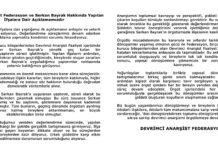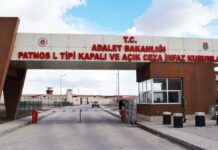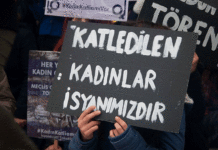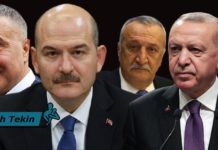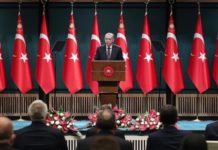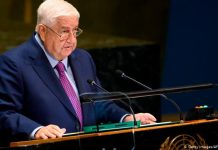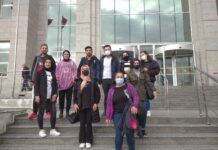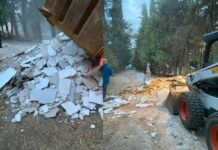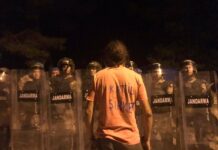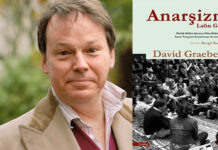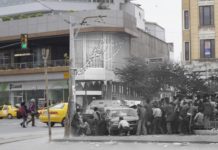We have interviewed CNT Foreign Relations Secratary Miguel Perez about CNT’s general strike, oppression, attacks and political developments following the Catalonia Referandum.
– What does Puigdemont’s last speech mean? Everyone was expecting more radical speech, especially afterwards the police attack to the Catalan people during the referandum process. Is this a part of strategy?
As you know, the situation changes in Catalonia by the hour. It’s very difficult to keep pace with events, even for comrades on the ground. So, by the time this interview goes to press, I’m sure any answer will be outdated!.
However, yes, Puigdemont gave a speech, kind of declaring independence but putting it immediately on hold, to allow for “negotiations”. To be honest, it wasn’t clear to anyone what he meant and, in any case, the prospect of the central government engaging in meaningful negotiations was non-existent. To all regards, his was an attempt to buy time, though it obviously led to nowhere. So, I don’t think it was part of a strategy, but rather a tacit recognition of his lack of choices.
On the one hand, the Catalan government has no way to enforce a single sided declaration of independence. This would immediately prompt the central government to suspend the local parliament (which is very likely to happen as of tomorrow, 28-10-2017, anyway) and use the police or the army to crack down on the independentist movement. But any declaration of independence is always going to be single sided, as the central government is NEVER going to agree to that.
On the other hand, he’s in a government coalition with some leftist hardcore independentist parties, which are pushing for that declaration to happen and threaten to withdraw their support and bring down the local government otherwise. There’s also a lot of people (tens of thousands) all the time in the streets, in rallies and demonstrations, demanding independence, adding pressure on Puigdemont and his government, calling them traitors (with reason).
He’s the prototypical right-wing moderate nationalist politician, who stirs up people’s mobilisation to serve his own ends and interests, and then finds himself trapped by that same mobilisation. I bet he now just wants to hide in a dark place and cuddle!
But the solution is at hand. The central government is about to step in with even more repression, which will allow Puigdemont to say that he tried hard to have a negotiated solution, but to no avail.
What will happen after this weekend is anyone’s guess, but it doesn’t look well.
– Before the referandum, we have witnessed many protest for the independence of Catalonia. What about the counter-protests of nationalists? Who had organised these protests? Did Catalan people really join these marches? What is the affect of these protests?
There’s always been a large part of the Catalan people who wanted independence, but this has by no means been unanimous. Even within nationalists, not all of them wanted independence. For instance, Puigdemont’s party, which has been ruling Catalonia on and off for the last 40 years, never had any declared independentist aims. It was rather comfortable making dealings with the Madrid government to achieve other goals within the framework of the Spanish constitution and regime. So, yeah, it’s likely many Catalans do not support independence, though it’s clear the vast majority do, by now. Even if they didn’t before the 1st of October, police repression may have done a great deal to convince them of the need to break away from Spain!
The main problem is in the rest of Spain. The country’s unity has long been a rallying banner for the far right, and we are already seeing many people leaning more to the right as a reaction to the Catalan drive for independence. This can give new breath to fascist groups, which were until now fairly small (though far too big to my liking!). They are already staging rallies and demonstrations of their own, or taking part in larger rallies for Spain’s unity, where they’re been worryingly well received by those attending.
This drive to the (far) right is in consonance with the calls for more repression that many “democratic” forces are issuing these days, which does not fare well for any dissidence. It’s a truly worrying perspective.
Giving the developments in Turkey over the last few years, I’m sure you can relate to the threat we’re facing here, even when there also are, no doubt, huge differences.
– How does CNT’s perspective on Catalonia Referandum? As anarchists, how do we understand the position of Catalonia; as freedom of the people or as a declaration of a new state?
In any situation of social upheaval and mobilisation, like the one going on in Catalonia at the moment, there are always many agendas at play. Right now, for most people on the street, the main issue is creating a new independent state. There’s no hiding it. It’s a purely nationalist agenda.
But by mobilising hundreds of thousands of people, getting them to organise meetings in their neighbourhoods, attend rallies, etc., other issues are coming to the fore, as well. For example, it’s OK to complain about police violence on referendum day, but most activists don’t forget that the Catalan leaders of today ordered a similar repression against the Indignados movement in 2011. So by no means nationalist leaders keep a tight control on the people, once you get them out on the streets. There’s a constant tension between strictly nationalist aims and other social and economic issues creeping forward, that is mostly regulated by events on the ground.
We, in CNT, see this as a chance to put our message across, encourage people to organise by themselves and go beyond strictly nationalist issues. Our position, as stated in our congress agreements, renewed in December 2015, is that we stand for people’s self-determination across the whole world (obviously, in Catalonia too). But we understand self-determination not as state building, but as self-management, that is, it must include issues like workers control of production and consumption, a direct democracy from the bottom up in a confederation, etc. On that respect, we’re neither concerned nor worried by the creation of a new state, but our concern is to advance the cause for self-management of the working class.
I know it’s a fine line we have to walk here. We’re trying to avoid playing into the hands of nationalist politicians, while being out in the streets with the people, for instance, against repression, and putting our message across. We’ve been criticised for it and there has been (and is) a lot of debate within our ranks about how to best do it. It’s only normal that at difficult times we hesitate on the way forward. I’m confident that CNT’s internal mechanisms for debate and collective decision making will allow us to steer the best course we can think of.
But consider this: there have been hundreds of events (demonstrations, rallies, the referendum itself…) to support independence, and CNT has neither called to take part in them nor supported them in any way. Instead, our comrades have been extremely active on the ground (where we have the means, which are far less that we would like or need), addressing meetings, talking at rallies, putting out leaflets and posters, explaining our point of view and stressing the need to go beyond just a demand for independence. I don’t think anyone can say we have just given in to the nationalists!
– We know the attraction of anarchist movement on Catalan independence movement in history. How is the situation now, what is the affect of anarchist movement in Catalonia now?
The anarchist and libertarian movement has, by no means, the influence and presence that it once had in Catalonia. Back in the days, when nationalist politicians wanted to stir the people into action to support their aims (as they are doing now), they had to go through the anarchists and the CNT, who might decide to support them or not. It made sense then to discuss the relationship between anarchism and nationalism on practical terms and in particular situations.
Large as it can be, when compared to other parts of the world, the anarchist movement in Catalonia is much smaller than it was in the 1930s and its ability to determine events is negligible. Same with the CNT. Saying otherwise would be fanciful. The best we can hope for is to influence matters, when there are large mobilisations, putting our message across. This we are trying to do, as explained.
In this context, having arguments about whether one libertarian organisation’s positions are playing into the hands of the nationalists is wishful thinking. Nationalists are going to play their hand anyway, because they don’t need us to get the people out in the streets anymore. Once they have put the wheels in motion, all we can do is trying to put our message across and take matters beyond their intended original goals. Which is no small task, considering our means, by the way. We can either do that, or stay away altogether and watch events unfold passively. This is the only real option. As a revolutionary organisation, CNT has decided not to shy away from the challenge.
All that said, my understanding is that there are different attitudes towards independence among the anarchists. While groups like Embat share a similar analysis to ours (with countless differences, no doubt), others have taken a decided anarcho-nationalist position and support independence outright. The fact is that we have found common ground with some anarchist organisations, to the extent that they featured in our call for the general strike in Catalonia on the 3rd of October and in our joint propaganda.
– As CNT, you have organised a general strike for supporting the Catalan people against the fascist reactions. Did the strike reach its aim in Catalonia and Spain?
The strike was only to take place in Catalonia on the 3rd of October, while many other solidarity rallies were called for, across Spain, for that evening. It was organised together with many other smaller unions, some closer to the nationalists, some more libertarian-leaning, so it was a joint initiative.
In the days leading to the independence referendum on the 1st of October, the central government had been building up a massive police presence across Catalonia to stop it from happening. As was anticipated, the repression on the day was widespread. Many of us could tell in advance that this would in turn lead to more protests and a period of civil disobedience, which was indeed the case. As such, it was only natural for us to call for a general strike, as the tool of choice for the unions and the working class in general, to protest, but also to disrupt police operations.
The shared perception is that the strike was a success. Many people stopped working for the day and tens of thousands joined the different rallies. In many towns, pickets blocked the roads to prevent police reinforcements from getting in or from moving around, getting supplies, etc.
As for CNT, we would have liked to be able to do more and have a larger presence across Catalonia. While some unions, that have a strong local presence, were incredibly active and successful, others were not so much, as their numbers are smaller, they are less active, or both. But altogether it was well worth it. Having CNT pickets in towns with banners reading “for liberties and rights! Bring down the regime!”, or comrades addressing thousands strong rallies with our distinctive message can only be viewed as positive.
One thing worth mentioning, is that this was the first time in some 40 years, that a general strike was organised by alternative unions, without the two mainstream business unions being involved. That’s a change of paradigm for you, right there. On this respect, it was a resounding success.
I also have to mention the solidarity that many comrades across the globe have shown, organising pickets or rallies in Spanish embassies, putting up our statements, etc. As you might know, CNT is in the process of creating a new international, together with our sister organisations, FAU, USI, FORA, IWW, etc. This has already strengthened our ties (and it shows, there were more than 50 events on the 3rd across the globe!), while many other organisations, including DAF, have expressed their solidarity in many different ways. We can’t be thankful enough to all of you.
– Another referandum had occured in Başur(South) Kurdistan. And Iraq is getting control of the cities of Kurdistan one by one. Turkey and Iran are also supporting this situation. How do we understand all of these events, if we want to read the Kurdistan and Catalonia referandum together? Is it something like a wave in whole world?
Yes, and there was also a referendum in Scotland which might be repeated soon after the vote on Brexit!
Has the dead bell for the nation state been told? I’m afraid not. If you look at these events, they aim at creating new states, as is the case in Başur. Barzani’s project for an independent oligarchic petrol state is similar in many ways to the Catalan leaders’ idea of statehood. Different flag and language, same old structures and economy. Maybe there’s a global trend towards breaking lager states into smaller ones, I don’t know, but this wouldn’t necessarily be a positive development.
Some anarchists argue for independence saying that the smaller the state, the easier it is to fight against it. Sure! That’s why San Marino and Monaco (or the Vatican City, for that matter) are long stablished libertarian communist societies. Jokes aside, it’s difficult to see how smaller states that are the outcome of a long communal struggle for independence are going to be less homogeneous and easier to crack than larger colonialist centralised ones.
Instead, what I find extremely compelling are the examples of society building from below that we have in Rojava and many other Kurdish communities. Specially since, in accordance with democratic confederalism, they do away with the notion of the nation state. I think these examples provide a clue to the whole situation and are an inspiration to all.
Because what we see globally is a breaking down of the tacit pact that has kept “democratic” societies going on for decades. As the economic crisis ravaged many societies across the world, from 2007 onwards, and it became obvious that the elites (political and economic, this including business unions) could no longer guarantee the expected level of income to the working class, waves of unrest swept across the world. In some places, this meant the rise of xenophobic fascist politicians, in some others, massive protest movements. Mix this with countless local factors and some years later you have certain local elites at the forefront if independentist movements.
Is this another case of “change everything, so everything stays the same”? I don’t know, it doesn’t really matter. What matters is if this energy can be harnessed towards deep revolutionary change, beyond the original plans of the politicians.
We can only find the answer to this question by pushing in that direction.
Thanks for the answers. We salute the struggle of CNT.
Thank you to Meydan Newspaper for letting us explain our views.
IN SOLIDARITY!
This interview was published in the 41. volume of Meydan Newspaper


